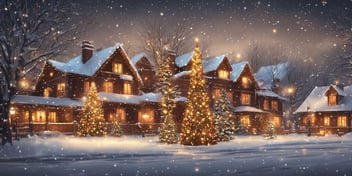- Blog
- Christmas lights
- How to Save on Your Christmas Lights Electric Bill

Are your Christmas lights adding a festive glow to your home, but also causing your electric bill to skyrocket? Well, fret not, because we've got you covered! 'Tis the season to save on your holiday expenses, and we're here to show you how to effectively light up your home without draining your wallet.
In this article, we'll share some smart tips and tricks on making your Christmas lights more energy-efficient, allowing you to spread cheer without blowing a fuse over your electricity bill. So grab a cup of hot cocoa, sit back, and get ready to learn how to save on your Christmas lights electric bill in a jolly and cost-effective way!
Understanding the Impact of Christmas Lights on Your Electric Bill
Christmas lights electric can significantly contribute to your monthly electricity expenses. The energy consumption depends on several factors, including the type of lights used and the duration they are turned on. For instance, traditional incandescent bulbs consume more electricity compared to LED lights. Let's say you have a string of 100 incandescent bulbs, and each bulb consumes 5 watts per hour. If left on for 6 hours a day for 30 days, they would consume a total of 9 kilowatt-hours (kWh). On the other hand, LED lights typically use less energy, with the same example consuming only 1.2 kWh. Choosing energy-efficient lights and controlling their usage can help you decrease the overall impact on your electric bill.
Setting a Budget for Christmas Lights
- Begin by calculating the total amount you can afford to spend on Christmas lights electric.
- Consider the size of your space and the number of lights required to achieve your desired ambiance.
- Prioritize energy-efficient options, such as LED lights, to save on electricity costs.
- Research and compare prices from different retailers or online platforms to find the best deals.
- Don't forget to include any additional accessories or installation costs in your budget.
- Consider reusing lights from previous years or borrowing from friends and family to reduce expenses.
- Set a realistic budget that aligns with your overall holiday spending plan. Remember, it's important to balance cost-saving with creating a festive atmosphere.
Choosing Energy-Efficient Christmas Lights
LED Lights: The Best Choice for Energy Savings
- LED lights are highly recommended for Christmas decorations due to their superior energy efficiency.
- Compared to traditional incandescent lights, LEDs consume significantly less electricity, resulting in substantial cost savings on your Christmas lights electric bill.
- LED lights can use up to 90% less energy than incandescent bulbs, making them a more environmentally friendly option.
- Additionally, LED lights have a longer lifespan, reducing the need for frequent replacements and further saving on expenses.
- By switching to LED lights, you can enjoy festive and vibrant Christmas decorations while minimizing energy consumption and lowering your electricity costs.
Comparing Energy Consumption of Different Types of Christmas Lights
When it comes to the energy consumption of different types of Christmas lights, there can be significant variations. Here are some points to consider:
- LED lights are the most energy-efficient option, using up to 90% less electricity than traditional incandescent lights.
- Incandescent lights are generally the least efficient, consuming more power and producing more heat.
- Miniature lights consume less energy than larger bulbs.
- Fiber optic lights are an energy-efficient alternative, as they use a single light source to illuminate multiple strands.
- It's important to check the packaging for energy labels or ratings to compare the efficiency of different lights before making a purchase.
- Switching to energy-efficient LED lights can result in significant savings on your Christmas lights electric bill.
Utilizing Solar-Powered Christmas Lights to Minimize Electricity Usage
Utilizing solar-powered Christmas lights is a great way to minimize your electricity usage during the festive season. By harnessing the power of the sun, these lights can operate without drawing any electricity from the grid. Solar-powered lights utilize small solar panels to charge during the day and automatically turn on at night, eliminating the need for regular power consumption.
Not only do solar-powered Christmas lights help reduce your energy bills, but they also have a positive environmental impact. By relying on renewable energy, you contribute to a greener and more sustainable holiday season.
You can find a variety of solar-powered Christmas lights on the market, including string lights, pathway lights, and even decorative figures. It's important to place the solar panels in a location that receives ample sunlight throughout the day for optimal charging.
Make the switch to solar-powered Christmas lights this year and enjoy the benefits of energy savings and eco-friendliness.
Optimizing the Usage of Christmas Lights
Strategically Placing Lights to Maximize Effectiveness
Strategically placing your Christmas lights can significantly impact their effectiveness while minimizing electricity usage. Consider the following tips:
- Focus on highlighting key areas: Place lights on trees, shrubs, and architectural features to enhance their natural beauty.
- Create depth and dimension: Hang lights at varying heights and depths to add visual interest and create a dynamic display.
- Utilize focal points: Direct attention to specific areas by placing lights around doorways, windows, or other focal points.
- Opt for reflective surfaces: Position lights near surfaces that can reflect their glow, such as mirrors or metallic ornaments.
- Avoid excessive overlapping: Space out lights to ensure each bulb shines brightly without being obscured by others.
By strategically arranging your Christmas lights, you can achieve a captivating display while optimizing energy efficiency.
Using Timers to Control Christmas Lights Electric Usage
Using timers to control your Christmas lights electric usage is a simple yet effective way to save on your electric bill. By setting timers to automatically turn off your lights during the night when no one is enjoying them, you can significantly reduce energy consumption. This ensures your lights are only on when needed, without the hassle of manually turning them on and off every day.
For example, you can set the timer to switch on the lights at dusk and turn them off around midnight when most people are asleep. This not only saves electricity but also extends the lifespan of your bulbs.
Dimming Lights or Using Lower Wattage Bulbs
Dimming your Christmas lights or using lower wattage bulbs can significantly reduce the electricity consumption without sacrificing the festive ambiance. Here are some tips for achieving energy savings:
- Invest in dimmable LED bulbs, which allow you to adjust the brightness based on your preferences.
- Utilize plug-in dimmer switches to control the intensity of your Christmas lights.
- Opt for lower wattage bulbs, such as mini or micro lights, which consume less electricity compared to larger, traditional bulbs.
- Consider using battery-operated LED lights for areas where you don't have access to electrical outlets.
By dimming the lights or choosing lower wattage bulbs, you can enjoy the beauty of your Christmas decorations while minimizing your electric bill.
Considering Light Alternatives to Reduce Energy Consumption
Consider using light alternatives to reduce your energy consumption during the Christmas season. Look for options like solar-powered lights, which harness solar energy during the day to power the lights at night, eliminating the need for electricity. Another alternative is to use battery-operated LED lights, which consume significantly less energy compared to traditional incandescent lights. These alternatives not only help save on your electric bill but also reduce your carbon footprint.
So, consider these eco-friendly options to enjoy festive lighting without the added energy costs.
Maintenance Tips for Energy Savings
Regularly Checking and Replacing Faulty Bulbs
Regularly checking and replacing faulty bulbs is an important step in optimizing the energy efficiency of your Christmas lights. Faulty bulbs can consume excessive electricity, leading to higher electric bills. To ensure maximum efficiency, inspect each bulb for any signs of damage, like flickering or dimming. Replace any malfunctioning bulbs promptly to prevent energy waste.
Additionally, consider using LED bulbs, which are more durable and last longer than traditional incandescent bulbs. By regularly monitoring and replacing faulty bulbs, you can minimize energy consumption and save on your Christmas lights electric bill.
Proper Storage of Lights to Avoid Damage
Properly storing your Christmas lights is important to avoid damage and ensure their longevity. Start by detangling the lights and removing any clips or hooks. Consider using a storage box or reel specifically designed for lights, as it helps prevent tangling and protects them from dust and moisture. Alternatively, you can wrap the lights around a piece of cardboard or a plastic hanger to keep them organized.
Store your lights in a cool, dry place to prevent heat damage or issues caused by humidity. Taking these simple steps will help preserve your lights for future use and save you money on replacements.
Cleaning Lights to Increase Brightness and Efficiency
Cleaning your Christmas lights regularly is important for maintaining brightness and improving energy efficiency. Dust, dirt, and debris can accumulate on the bulbs and wires, reducing the amount of light they emit. Use a soft cloth or sponge dampened with water or a mild cleaning solution to gently wipe the lights. Ensure the lights are unplugged and completely dry before plugging them back in.
Cleaning also helps to prolong the lifespan of the lights, ensuring they last for many more festive seasons to come.
Wrapping up
With the holiday season approaching, many people are looking for ways to save on their Christmas lights electric bill. One simple tip is to switch to LED lights, which are more energy-efficient and last longer than traditional incandescent bulbs. Another suggestion is to use a timer to automatically turn off the lights during the night or when no one is home, reducing unnecessary electricity consumption.
Additionally, opting for solar-powered lights can further reduce electricity costs. Lastly, consider using fewer lights or decorating with alternative options, such as candles or DIY crafts, to save even more on the electric bill this holiday season.
Read On

Green Christmas Lights: A Sustainable Holiday Decorating Idea
The holiday season is just around the corner, which means it's time to deck the halls and spread...

The Benefits of Energy-Efficient Christmas Lights
'Tis the season to be merry—and energy-efficient! As we deck the halls and string up twinkling...

The Ultimate Guide to Christmas Light Bulbs: What You Need to Know
'Tis the season to be merry and bright, quite literally, as the splendid glow of Christmas lights...